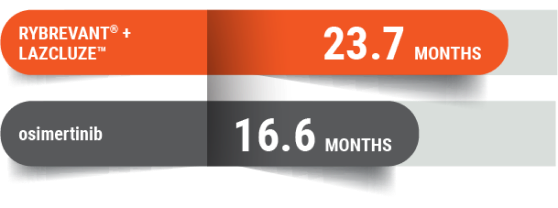More time without disease worsening
RYBREVANT® + LAZCLUZE™ is the only chemotherapy-free treatment proven to reduce the risk of cancer growing or spreading by 30% compared with the current standard of care (osimertinib†)
At 23.7 months, half of the people receiving RYBREVANT® + LAZCLUZE™ lived without their cancer growing or spreading, compared with
16.6 months for osimertinib alone.

About the clinical trial
These results are from a clinical trial where 858 people with advanced NSCLC with exon 19 deletions or exon 21 L858R received a first treatment of RYBREVANT® in combination with LAZCLUZE™ or a first treatment of osimertinib alone. The main goal of the clinical trial was to measure how long people were on treatment before their cancer started growing or spreading. A secondary goal of the clinical trial was to measure how long people in the study lived.
Live longer
RYBREVANT® + LAZCLUZE™ is the first and only treatment proven to reduce the risk of death by 25% compared with osimertinib alone
Median overall survival is the amount of time after a study starts when half of the people are still alive.
After approximately 3 years of follow up, median overall survival for RYBREVANT® + LAZCLUZE™ had not been reached. Median overall survival for patients taking osimertinib was reached at 36.7 months.
*Mutations include exon 19 deletion or exon 21 L858R substitution mutations.
†Osimertinib is a preferred first treatment option for EGFR exon 19 deletions or exon 21 L858R mutations in the NCCN Clinical Practice Guidelines in Oncology (NCCN Guidelines®).
Referenced with permission from the NCCN Clinical Practice Guidelines in Oncology (NCCN Guidelines®) for Non–Small Cell Lung Cancer V.8.2025. © National Comprehensive Cancer Network, Inc. 2025. All rights reserved. Accessed August 15, 2025. To view the most recent and complete version of the guideline, go online to NCCN.org. NCCN makes no warranties of any kind whatsoever regarding their content, use or application and disclaims any responsibility for their application or use in any way.
EGFR+ = mutated epidermal growth factor receptor; NSCLC = non–small cell lung cancer
Side effects
There are side effects that you may experience during treatment with RYBREVANT® + LAZCLUZE™.


Savings & support
Once prescribed a RYBREVANT®-based treatment, connect with a Care Navigator for your support needs.



